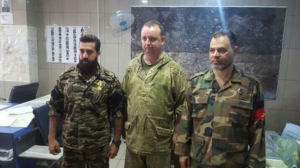
Photo 1. Russian officer, middle, with Quds Brigade chief Mohammad al Saeed, right, and operations commander Mohammad Rafi, posted in October 2016.
Senior commanders in the Sunni Palestinian Quds Brigade, known as the Liwa al Quds or the Syrian Arab Army Fedayeen, have been photographed receiving medals from Russian military officers for battlefield action. The latest interaction further indicates the deep level of Russian involvement and impact they are having on the Syrian civil war.
The pro-government militia is drawn from the Palestinian diaspora in Aleppo province, and has openly operated as an auxiliary to pro-regime forces there since 2013. The unit numbers in the several hundreds.
Late last month, the Quds Brigade and the Syrian Arab Army succeeded in taking the strategic Handarat Palestinian refugee camp and Kindi Hospital north of Aleppo proper, following the launch of an offensive in late September and several rounds of intense back-and-forth with the Islamist-led Fatah Halab coalition. Pro-regime forces and the Quds Brigade have been fighting to control the camp since 2014.
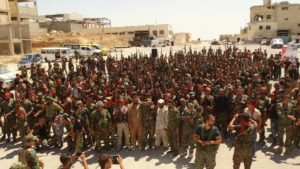
Photo 2. Quds Brigade fighters following the capture of Handarat Camp, posted on October 1.
The capture of Handarat was a significant victory, particularly for the Palestinian militia, whose members are drawn from the town. Capturing that area and the adjacent Kindi Hospital consolidates pro-regime control over a key road north of Aleppo, and has opened a front to push toward the rebel-held area of the city. The Quds Brigade has reportedly continued to make gains in the surrounding areas.
Several days after the victory at Handarat, photographs surfaced of a Russian military officer bestowing medals to the militia chief Mohammad al Saeed, an engineer by vocation, and operations commander Mohammad Rafi (AKA “the Godfather”) (photo 1). Prior to launching the operation to fully retake the camp on Sept. 29, the two Palestinian commanders were photographed with what appears to be their Russian military advisor (photo 3).
Earlier in August, Rafi had received a medal from a Russian Lieutenant General (photo 4). The patch on the senior commander’s shoulder is the emblem of the 18th Guards Motor Rifle Division (photo 5), a unit stationed near Grozny, Chechnya. Members from this unit have operated in Ukraine and Syria.
In June, middle-aged men in Russian uniforms appeared in a photograph of Quds Brigade fighters (photo 6). And back in March, a Russian operative, whom pro-regime accounts claimed was an officer and appears to be special forces or a mercenary, was photographed alongside Russian media visiting the headquarters of the Quds Brigade and meeting with top commanders (photo 7). These relations indicate Russia’s support of the Quds Brigade.
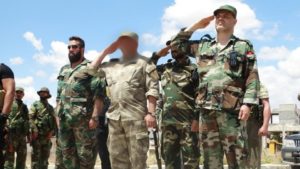
Photo 3. Two senior Palestinian commanders with Russian officer, posted on September 29 prior to taking Handarat Camp.
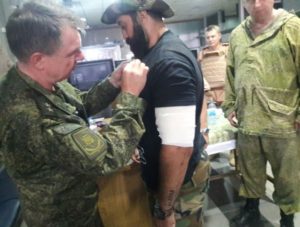
Photo 4. A Russian Lieutenant General bestowing medal on Quds Brigade commander Mohammad Rafi, posted in August 2016.
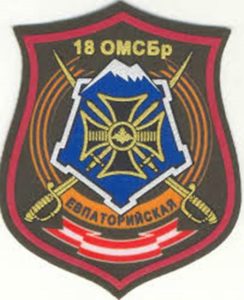
Photo 5. 18th Guards Motor Rifle Division emblem matching the commander’s patch in the previous image.
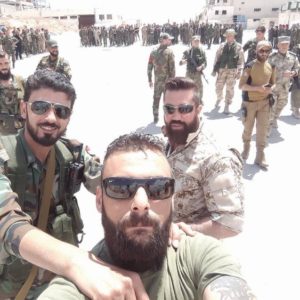
Photo 6. Quds Brigade combatants with Russian officers in the back, posted in June 2016.
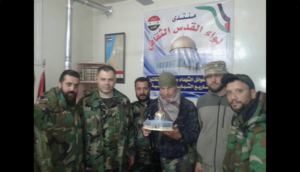
Photo 7. Senior Quds Brigade combatants with an alleged Russian operative, March 2016.
Weapons used by the groups show Russia’s influence on the battlefield. Below is the card of a dead fighter which was posted by Fastaqim Union, part of Fatah Halab, in late September (Photo 8). “Weapons type: Russian rifle,” is written on the card. It is unusual to put such information on a military card, though it indicates that the fighter is qualified to operate Russian weapons. There are also photographs of Quds Brigade fighters brandishing Russian weapons, though the models of those weapons date back to the Soviet era and they were abundant in Syria prior to the civil war. The Palestinian fighters, however, have wielded RPG-26 (photo 9); there is no evidence in open source that this was supplied to Syria prior to the war, though it was developed in the early 1980’s, according to military experts who spoke with The Long War Journal.
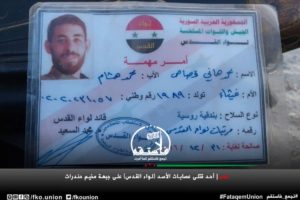
Photo 8. Military identification of Quds Brigade fighter.
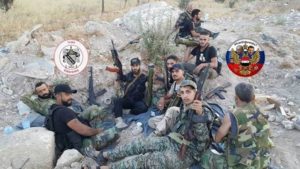
Photo 9. The Quds Brigade fighter in the back is holding an RPG-26.
Russian state media, furthermore, has been embedded with the Quds Brigade. The crew of Anna News, for instance, accompanied combatants into Handarat Camp when they took the area briefly on Sept. 23.
Russia is known to cooperate with forces allied with Bashar al Assad, such as the Syrian People’s Protection Units (YPG) that also receives U.S. support. Iran’s Islamic Revolutionary Guard Corps (IRGC) passes intelligence to Russia for airstrikes. There are, however, indications of more intimate Russian support of the Quds Brigade: the open commendations of the Quds Brigade militia by senior Russian officers for battlefield achievements, the presence of Russian military advisers among combatants, and Russian media coverage of the militia.
The Quds Brigade vows to continue fighting in Syria in support of the Syrian government, and has aspirations towards Jerusalem. On the anniversary of the foundation of the militia, which occurred on Oct. 6, a pro-militia account posted the following on social media: “Today (October 6th) is the anniversary of the Liwa Quds founding, the honorable and proud Liwaa. We promise you of liberating Al-Quds and all of Palestine after cleansing our country dear Syria from the terrorist filth. A country you don’t protect, is a country you don’t deserve to live in.”
Boris Zilberman contributed to this article.